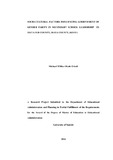| dc.description.abstract | The purpose for this study was to find out the socio-cultural factors that affect the gender parity in leadership of secondary schools in Siaya Sub-county, Siaya County. It sought to examine the influence of policies and practices that govern appointment into leadership, patriarchal culture, domestic responsibilities of female teachers and marital status on achievement of gender parity in secondary school leadership in Siaya Sub County. The study was based on the broaden-and-build theory. This was a descriptive research design where the target population comprised of 47 principals, 47 deputy principals and 500 teachers, 2 directors of education and 2 directors of TSC at the county. The 17 schools were randomly selected. The sample consisted of 17 principals, 17 deputy principals, 150 teachers, 2 directors of education and 2 directors of TSC. The study used questionnaires and interview schedule to obtain information. Qualitative data was organized in themes and presented as narratives. Analyzed data was presented in tables, charts and graphs. The study revealed that the existing policies and practices governing appointment of secondary school teachers in leadership were not effective because they did not solve the problem of gender disparities conclusively; The Patriarchal culture discouraged many qualified women in applying for leadership positions in secondary schools as they viewed leadership as a preserve for men; Domestic responsibilities negatively influenced gender parity as it mainly affected more women than men and marriage was a great hindrance to women teachers taking up leadership roles in secondary schools. Male spouses influenced the working station of female teachers and this affected their leadership in schools as majorities forego the leadership positions if they were far away from their spouses. The study recommended that the policies and practices governing promotion and appointment into leadership in secondary schools should be effected to ensure gender parity; the community should be sensitized on women and leadership in schools to bringing about gender parity; The teachers service commission should give married women leadership positions not far away from their families. Suggestions for further studies: to investigate gender and leadership styles; the influence of Kenyan constitution on gender parity in leadership in secondary schools. | en_US |

